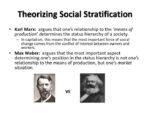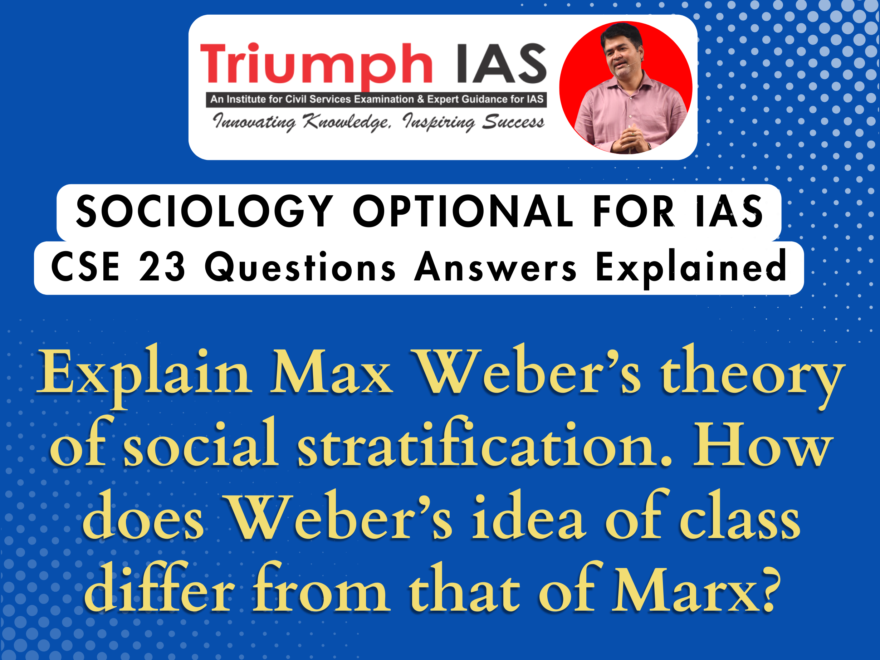Explain Max Weber’s theory of social stratification. How does Weber’s idea of class differ from that of Marx?
Section: B.
Sociology Paper 2023 Analysis.
Relevant for Paper-1 : sociological thinker : karl marx , max weber
Question- 6 (B):Explain Max Weber’s theory of social stratification. How does Weber’s idea of class differ from that of Marx? (20 Marks)
|
Introduction: Define social stratification according to Trinitarian idea based on class, status power. Main Body: Explain in brief the class, status, party; differentiate between the idea of class given by Marx and Weber. Conclusion: Conclude the idea on the basis of significance. |

IntroductionSocial stratification refers to the hierarchical arrangement of individuals or groups in a society based on various factors such as wealth, power, and prestige. Max Weber, a German sociologist, contributed significantly to the understanding of social stratification. His theory incorporates a Trinitarian idea, emphasizing the interplay of three distinct components: class, status, and party. It is among and between these three kinds of groups that the historically decisive struggles over power are about to take place. Main body:Class, Status, and Party in Weber’s Trinitarian Idea:
Marx vs. Weber: A Comparative Analysis of Class Concepts
Weber: Introduces a more complex class structure. He identifies multiple classes, recognizing that individuals can occupy different positions based on a combination of economic, social, and cultural factors. Weber classified class structure in four parts –
ConclusionMarx’s concept of class is primarily economic, leading to a revolutionary transformation, while Weber’s concept is more multidimensional, considering various factors such as status and power, and lacks the deterministic view of a predetermined class conflict and revolution. Weber’s approach provides a more nuanced understanding of social stratification, acknowledging the complexity of modern societies. |
Related Blogs…
 |
 |

To master these intricacies and fare well in the Sociology Optional Syllabus, aspiring sociologists might benefit from guidance by the Best Sociology Optional Teacher and participation in the Best Sociology Optional Coaching. These avenues provide comprehensive assistance, ensuring a solid understanding of sociology’s diverse methodologies and techniques.
META TAGS:
Iron Law of Oligarchy, Robert Michels, Vilfredo Pareto, Lions and Foxes theory, power dynamics, organizational oligarchy, elite circulation, political sociology, leadership styles, organizational control, sociological theories, political maneuvering, elite differentiation, power concentration, societal stability, political leadership, strategic political leadership, Sociology Question Paper, Sociology Question Paper 2023, Sociology Question Paper CYQ, Sociology Question Paper UPSC, What, according to Robert Michels, is the iron law of oligarchy? Do lions and foxes in Vilfredo Pareto’s theory, essentially differ from each other? Substantiate.
Why Vikash Ranjan’s Classes for Sociology?
Proper guidance and assistance are required to learn the skill of interlinking current happenings with the conventional topics. VIKASH RANJAN SIR at TRIUMPH IAS guides students according to the Recent Trends of UPSC, making him the Best Sociology Teacher for Sociology Optional UPSC.
At Triumph IAS, the Best Sociology Optional Coaching platform, we not only provide the best study material and applied classes for Sociology for IAS but also conduct regular assignments and class tests to assess candidates’ writing skills and understanding of the subject.
Choose The Best Sociology Optional Teacher for IAS Preparation?
At the beginning of the journey for Civil Services Examination preparation, many students face a pivotal decision – selecting their optional subject. Questions such as “which optional subject is the best?” and “which optional subject is the most scoring?” frequently come to mind. Choosing the right optional subject, like choosing the best sociology optional teacher, is a subjective yet vital step that requires a thoughtful decision based on facts. A misstep in this crucial decision can indeed prove disastrous.
Ever since the exam pattern was revamped in 2013, the UPSC has eliminated the need for a second optional subject. Now, candidates have to choose only one optional subject for the UPSC Mains, which has two papers of 250 marks each. One of the compelling choices for many has been the sociology optional. However, it’s strongly advised to decide on your optional subject for mains well ahead of time to get sufficient time to complete the syllabus. After all, most students score similarly in General Studies Papers; it’s the score in the optional subject & essay that contributes significantly to the final selection.
“A sound strategy does not rely solely on the popular
Opinion of toppers or famous YouTubers cum teachers.”
It requires understanding one’s ability, interest, and the relevance of the subject, not just for the exam but also for life in general. Hence, when selecting the best sociology teacher, one must consider the usefulness of sociology optional coaching in General Studies, Essay, and Personality Test.
The choice of the optional subject should be based on objective criteria, such as the nature, scope, and size of the syllabus, uniformity and stability in the question pattern, relevance of the syllabic content in daily life in society, and the availability of study material and guidance. For example, choosing the best sociology optional coaching can ensure access to top-quality study materials and experienced teachers. Always remember, the approach of the UPSC optional subject differs from your academic studies of subjects. Therefore, before settling for sociology optional, you need to analyze the syllabus, previous years’ pattern, subject requirements (be it ideal, visionary, numerical, conceptual theoretical), and your comfort level with the subject.
This decision marks a critical point in your UPSC – CSE journey, potentially determining your success in a career in IAS/Civil Services. Therefore, it’s crucial to choose wisely, whether it’s the optional subject or the best sociology optional teacher. Always base your decision on accurate facts, and never let your emotional biases guide your choices. After all, the search for the best sociology optional coaching is about finding the perfect fit for your unique academic needs and aspirations.
Follow us :



Find More Blogs…
| Compare and contrast Karl Marx’s and Max weber’s | Karl Marx- Historical Materialism |
| Position of Women In the Modern Indian Society | Sociology: Social system and pattern variables |
KEYWORD: Max Weber’s theory of social stratification,Max Weber’s theory of social stratification,Max Weber’s theory of social stratification,Max Weber’s theory of social stratification,Max Weber’s theory of social stratification,Max Weber’s theory of social stratification,Max Weber’s theory of social stratification,Max Weber’s theory of social stratification,Max Weber’s theory of social stratification,Max Weber’s theory of social stratification,Max Weber’s theory of social stratification,Max Weber’s theory of social stratification,Max Weber’s theory of social stratification, Max Weber’s theory of social stratification,



